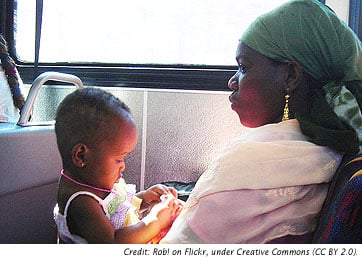
 (WOMENSENEWS)–Statistics showing that African American women die at much higher rates in childbirth and pregnancy don’t surprise Dr. David R. Williams.
(WOMENSENEWS)–Statistics showing that African American women die at much higher rates in childbirth and pregnancy don’t surprise Dr. David R. Williams.
"This pattern is not unique to childbirth," said Williams, a professor of African and African American studies and of sociology at Harvard University in Cambridge, Mass. "It affects the health of African Americans from cradle to grave and has continued for over 100 years. Today African Americans are more likely to die of 13 of the top 15 causes of death than are whites."
While college-educated black women who have well-paying jobs do have better health outcomes than poor unemployed black women who don’t finish high school, Williams says they still don’t do as well as their white counterparts because of the inequalities in society.
Despite federal anti-poverty programs, the civil rights movement and major advances in obstetrics, African American women are three to four times more likely to die in childbirth than white women.
In 2005, 347 white women died compared to 245 black women, according to Dr. William M. Callaghan, acting chief of the maternal and infant health branch of the division of reproductive health at the Atlanta-based Centers for Disease Control and Prevention (CDC). But African American women’s far smaller share of the national female population means their death rates are four times higher, on average, than those of white women.
In places such as New York City, the risks are even greater–African American women die seven times more often than pregnant white women.
"Leveling the playing field for African American women in childbirth will require healing the health care system as well as the woman," Williams said. "Hospitals and health care providers must change their policies and practices."
Lack of Data Stalls Change
Changing hospital policies and practices of health care practitioners is hampered by the lack of data.
The CDC estimates that 1,000 American women die of pregnancy-related complications each year, but the number may be even higher because there is no federal requirement to report maternal deaths.
"Only 30 states have formed maternal review committees, so it is difficult to draw conclusions based on the limited number of deaths in a particular state like New York or California," said Dr. Jeffrey C. King, chair of the maternal mortality special interest group of the American College of Obstetricians and Gynecologists, the Washington-based professional organization of physicians with advanced training in women’s health.
"America must do better," King added. "Every maternal death needs to be investigated in the United States–as it is in Great Britain–so that changes can be made to improve the quality of care. While the total number of maternal deaths is small, it is worrisome because every woman who dies is a tragedy for her family and society."
A recent report by the New York Academy of Medicine and the New York City Health Department found that African Americans–only 24 percent of city’s maternity wards–had the largest percentage of deaths in all four leading causes of maternal mortality: embolism, hemorrhage, infection and pregnancy-induced hypertension.
Compared to whites, blacks nationwide receive less income at the same level of education and have fewer assets at equivalent incomes that can be tapped to pay for quality health care. Black women also may have had limited income earlier in life, so that hypertension, heart disease and other conditions that can lead to childbirth-related death are not diagnosed or treated appropriately.
But some insurance data in the New York study cast doubt on the extent to which a woman’s personal finances can be specifically correlated to things going wrong in pregnancy and childbirth.
Toll of Discrimination
Discrimination over a lifetime and institutional racism take an immeasurable toll on women’s health. Recent studies have shown that prolonged stress may increase anyone’s risk for infection. Stress may also trigger the release of hormones that lead to premature labor.
America’s overall record on maternal mortality is poor. A 2010 report by the United Nations placed the United States 50th in the world for maternal mortality.
The U.N. data indicated that the vast majority of countries reduced maternal mortality ratios for a global decrease of 34 percent between 1990 and 2000, while the rate nearly doubled in the United States. America’s standing is alarming because the United States spends more on childbirth-related care than any other area of hospitalization–$86 billion a year.
Maternal mortality suffers from a poverty of interest.
The CDC estimates that quality maternal care could prevent 40 to 50 percent of maternal deaths and 30 to 40 percent of near-deaths and complications. But research to determine more effective practices has languished in the last 40 years because scientists and clinicians have focused on reducing infant deaths.
"At the beginning of the 20th century, the number of maternal deaths plummeted because we took a close look at why women were dying and came up with innovations in prenatal care and delivery," said Dr. Franklyn H. Geary Jr., a professor and director of the division of maternal fetal medicine of obstetrics at Morehouse School of Medicine in Atlanta. "Similar research is needed today because maternal mortality is a daunting problem, especially for African Americans."
Would you like to Comment but not sure how? Visit our help page at https://womensenews.org/help-making-comments-womens-enews-stories.
Would you like to Send Along a Link of This Story?
https://womensenews.org/story/reproductive-health/110421/black-womens-maternal-risks-go-unquestioned
Sharon Johnson is a New York-based freelance writer.
For more information:
American College of Obstetricians and Gynecologists:
http://www.acog.org
Association of Women’s Health, Obstetric and Neonatal Nurses:
http://www.awhonn.org


